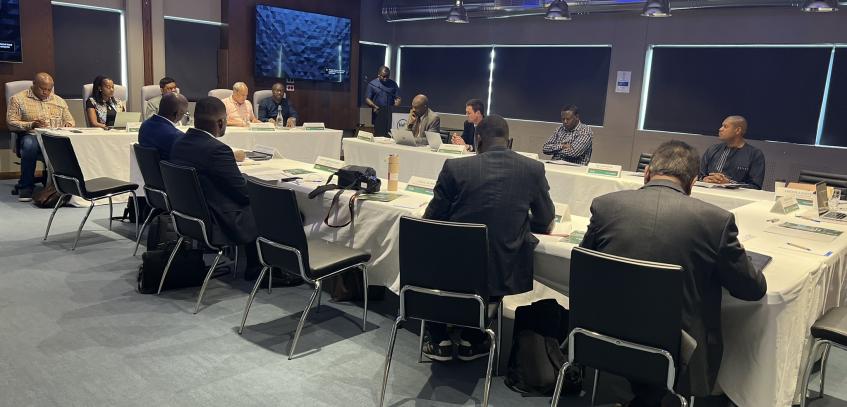The African Union (AU) Economic, Social, and Cultural Council (ECOSOCC) held consultations with the AU’s Peace and Security Council (PSC) Secretariat from September 7-8th, on the Civil Society Organizations (CSO) Database on the African Peace and Security Architecture (APSA) and to develop an implementation matrix.
The meeting symbolized significant progress in empowering CSOs to exert a more influential role in shaping the trajectory of Africa's future and integrating their expertise into the operational machinery of the PSC.
Officially opening the meeting, H.E. Amb Dharmraj Busgeeth, Mauritius' Ambassador Extraordinary and Plenipotentiary to the Federal Democratic Republic of Ethiopia and the AU, commended ECOSOCC for its work and the effective execution of its mandate.
He advocated for ongoing dialogue and proactive measures to ensure the successful implementation of the CSO database.
Ambassador Busgeeth urged the PSC Secretariat and ECOSOCC, to craft a comprehensive collaboration plan that would put the peace and security initiatives like the Livingstone formula, into practical use, while underscoring the critical importance of raising awareness about the initiatives at regional, national, and continental levels, involving all African citizens.
Mr. Khalid Boudali, ECOSOCC’s Presiding Officer underscored ECOSOCC’s persistent endeavours to actively involve CSOs across all echelons and reiterated the Organ’s commitment to representing the voice of the African citizenry. He emphasized that the APSA programme offered a strategic platform for ECOSOCC to make substantial contributions to the African Union's initiatives, notably within the Peace and Security Council (PSC).
Mr. William Carew, ECOSOCC’s Head of Secretariat underscored the central purpose of the meeting—a purpose firmly grounded in ECOSOCC's pioneering initiatives aimed at providing support to the PSC through the comprehensive integration of civil society. He highlighted the significant strides achieved in developing the CSO database for organizations operating in the realm of Peace and Security.
“This instrument is poised not only to invigorate the principles embodied in the Livingstone Formula and the Maseru Conclusions but also to position civil society at the forefront of AU peace and security efforts, particularly within the pillars of the APSA,” he said.
Ms. Neema Chusi, Head of Secretariat, AU Peace and Security Council (PSC), emphasized the need for a centralized database for CSOs in peace and security. She stressed that the database's development aligns with Article 20 of the Peace and Security Protocol, ensuring that CSOs' voices on the ground were effectively integrated into decision-making processes. Ms. Neema further praised ECOSOCC's ongoing efforts and called for continued collaboration to maximize Article 20's potential.
Mr. Raymond Kitevu, Common Market for Eastern and Southern Africa (COMESA) expert on the Continental Early Warning System (CEWS) stressed the importance of a comprehensive CSO Database and called upon ECOSOCC to explore innovative methodologies, to ensure the thorough inclusion of all accredited CSOs in the database.
The consultations yielded favourable results, which included a pre-validated CSO Database and a continental online platform and fostering a cohesive collaborative relationship between ECOSOCC and the PSC Secretariat. During the meeting, the recently developed CSO database of CSOs operating in the peace and security sector underwent technical assessment and received feedback from the PSC Secretariat, followed by the delineation of subsequent implementation steps.
Furthermore, through extensive deliberations, the meeting resulted in a detailed implementation matrix and meeting schedule for the coming year, with both the PSC and ECOSOCC committed to ensuring its effective execution.
The engagement matrix, built upon the identification of seven collaboration areas, will lead to more informed decision-making within the PSC in future interactions. As such, this will bolster the impact and effectiveness of CSO insights in shaping PSC decisions and policy considerations.
The consultation had active participation from key stakeholders, including the ECOSOCC Peace and Security Cluster and Political Affairs Cluster Chairs, greatly enhancing the quality of discussions and outcomes. Given the complex nature of emerging security issues in Africa, including Unconstitutional Changes of Government (UCG), their involvement was crucial.
The meeting represented significant milestones in Africa's continued journey toward achieving peace, security, and inclusive governance. It underscored the continent's commitment to harnessing the influence of Civil Society Organizations to sculpt a brighter future for all Africans and highlight the pivotal role played by the CSO database in facilitating improved coordination and communication among CSOs, the AU, and APSA stakeholders, thereby offering tangible support to peace and security efforts in Africa.





